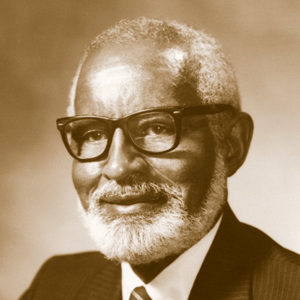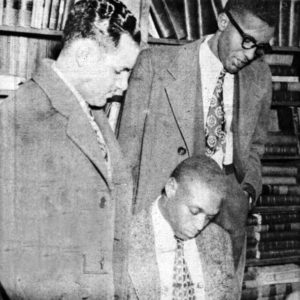calsfoundation@cals.org
William Harold Flowers (1911–1990)
William Harold Flowers was a lawyer, minister, social and political activist, and one of the leading figures in the civil rights movement in Arkansas in the 1940s. He was the first African American special circuit judge in Jefferson County and a president of the African-American National Bar Association. He was also active in the National Association for the Advancement of Colored People (NAACP) in the state, serving as president of the Pine Bluff (Jefferson County) branch and as president of the state conference of branches.
Born on October 16, 1911, in Stamps (Lafayette County), William Harold Flowers was the son of Alonza (often spelled Alonzo) Williams Flowers Jr., a businessman, and Beulah Lee Sampson, a schoolteacher. He was the eldest of three boys.
After witnessing the lynching of John Carter in Little Rock (Pulaski County) in 1927, while there on a trip with his father, Flowers resolved to fight for civil rights. He enrolled in the Robert H. Terrell Law School in Washington DC and later passed the Arkansas Bar examination in 1935. He set up a law practice in Pine Bluff in 1938. He married Margaret J. O. Brown, and the couple had nine children.
Throughout the 1940s, Flowers was the leading advocate for civil rights in Arkansas. Flowers set up the Committee on Negro Organizations (CNO) in Stamps (Lafayette County) on March 10, 1940, to coordinate voter registration campaigns in the state. As a result of his efforts, the number of eligible black voters in Arkansas rose from 1.5 percent in 1940 to 17.3 percent by 1947. When the NAACP set up an Arkansas state conference of branches in 1945, Flowers was appointed as its chief recruitment officer.
In a 1947 case, Flowers won a landmark victory in the courts by winning death sentence commutations for two brothers accused of killing two white men. The victory was partly due to his demanding and receiving the appointment of black jury members, who served for the first time in the county since Reconstruction.
In February 1948, Flowers was instrumental in the desegregation of the University of Arkansas School of Law in Fayetteville (Washington County), acting as counsel to the successful black applicant Silas H. Hunt. Later that year, Flowers was elected as president of the NAACP state conference of branches. In 1949, Flowers sued for the equalization of school facilities for black and white children in DeWitt (Arkansas County), thereby paving the way for school desegregation cases in the state after the U.S. Supreme Court decision in Brown v. Board of Education of Topeka, Kansas in 1954.
In the 1950s, Flowers’s civil rights leadership was eclipsed by friends and protégés, such as Daisy Bates and Wiley A. Branton. Nevertheless, Flowers remained an important and influential figure in Arkansas. In 1953, he served as president of the African-American National Bar Association. He was ordained as a United Methodist minister in 1971 and remained active in the church until his death. In 1977, he became the first black special circuit judge in Jefferson County. In 1980, Governor Bill Clinton appointed him as an associate justice in the state court of appeals. A year later, the Arkansas Black Lawyers’ Association was renamed the W. Harold Flowers Law Society in his honor.
Flowers died on April 7, 1990, in Pine Bluff and is buried in Forest Lawn Memorial Gardens in Pine Bluff.
For additional information:
Kirk, John A. “‘He Founded a Movement’: W. H. Flowers, the Committee on Negro Organizations and Black Activism in Arkansas, 1940–1957.” In The Making of Martin Luther King and the Civil Rights Movement in America, edited by Brian Ward and Tony Badger. London: Macmillan, 1996.
———. “The Legacy of William Harold Flowers.” Arkansas Times, February 1, 2018, pp. 16–19. Online at https://www.arktimes.com/arkansas/the-legacy-of-william-harold-flowers/Content?oid=14123431 (accessed July 25, 2023).
———. “The Little Rock Crisis and Postwar Black Activism in Arkansas.” Arkansas Historical Quarterly 56 (Autumn 1997): 273–293.
———. Redefining the Color Line: Black Activism in Little Rock, Arkansas, 1940–1970. Gainesville: University Press of Florida, 2002.
John A. Kirk
Royal Holloway, University of London (UK)
This entry, originally published in Arkansas Biography: A Collection of Notable Lives, appears in the CALS Encyclopedia of Arkansas in an altered form. Arkansas Biography is available from the University of Arkansas Press.
 Civil Rights and Social Change
Civil Rights and Social Change Law
Law World War II through the Faubus Era, 1941 through 1967
World War II through the Faubus Era, 1941 through 1967 William Harold Flowers
William Harold Flowers  Silas Hunt; Wiley Branton; and Harold Flowers
Silas Hunt; Wiley Branton; and Harold Flowers 




Not only did the Arkansas State Press newspaper support the leadership activities of civil rights attorney W. Harold Flowers Sr., but Flowers also wrote for the paper. He wrote under the pseudonym Frances Sampson, which was the name of his maternal grandmother. In his articles, he reported on the activities of his civil rights association, the Committee on Negro Organization (CNO), and on the activities of “W. Harold Flowers, Sr.” in the courtroom. He also wrote a few articles and columns under his real name. I’m the niece of W. Harold Flowers Sr.